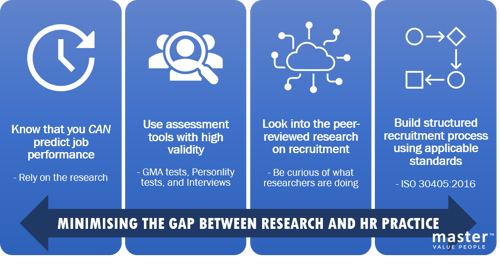Linking HR practice and HR research
How can it then be, when we know what is best, we still do something else?
Results from research on HR and especially recruitment methods have been reproduced over several decades with small variations. Nevertheless, findings such as the advantages of GMA tests in recruitment (read more) is still not considered to be best practise among HR professionals (Fisher et al, 2020).
In addition to this by using research on Utility Analysis, we know how large the economic advantage of listening to science is in regard to recruiting. We have even created the Master Recruitment Decision Tool, where you can calculate the financial benefits using your own data combined with acknowledged research (read more).
How can it then be, when we know what is best, we still do something else?
A gap between research and practice
Fisher et al (2020) found a significant gap between how HR practices are conducted and what we know from research. The largest mismatch between HR research and HR practice is found in the field of recruitment, which has not changed over almost 20 years (Fisher et al, 2020). In the research conducted by Fisher et al (2020), they studied different myths in HR and how strongly they were incorporated in the practice of HR Professionals in Canada and USA. The research showed that relatively many HR Professionals falsely believed future job performance could not be predicted at all.
This might indicate that the reason why GMA tests are not implemented in every recruitment practice is due to the disbelief, that recruitment methods can be based on science, and if done so, recruiters do in fact have the possibility to predict future performance (Fisher et al, 2020).
So, we will here encourage HR professionals working with recruitment to explore the research in the area. Build your recruitment process around recognised standards. And use data from for example GMA tests as assessment tools when recruiting.
And once you have recognised the usefulness of test in recruiting, it is also important to know how to choose a great testing tool from a bad. Using the right assessment tools with high validity is essential (read more).
ISO standards for recruitment
As mentioned, the area within HR, that has the highest potential for data-driven research to be incorporated in the HR practices, is the area of recruitment and selection (Fisher et al, 2020). Here it is worth mentioning, that the ISO (International Organization for Standardization) has developed a standard for recruitment. Following these standards for recruitment ensures a structured approach to recruitment and thereby elevates the quality of the process, focusing on the candidate experience, and ensuring an evidence-based process, that is easy to evaluate on in practice.
Recommendations to HR professionals
The elements presented are quite easy to implement in the practice of HR Professionals. It all starts with understanding that recruitment is not about taking ill-considered chances. Job performance can be predicted. Then knowing what tools to use, why to choose these tools, and how to best administer them. Research also advocates for HR Professionals to use their professional curiosity to search for and look at relevant research within the field of HR. And ultimately, we have here presented a framework from ISO to help create structured recruitment processes.

Figure – Minimising the gap between research and HR practice by Master International A/S
References
Fisher, P., Risavy, S., Robie, C., Köni, C., Christiansen, N.D., Tett, R.P., and Simonet, D.V. (2020) Selection Myths: A Conceptual Replication of HR Professionals’ Beliefs About Effective Human Resource Practices in the US and Canada. Journal of Personnel Psychology, Volume 20(1): 1-28 (in press). https://doi.org/10.1027/1866-5888/a000263
ISO 30405:2016(E) - Human resource management — Guidelines on recruitment - https://www.iso.org/standard/64149.html






